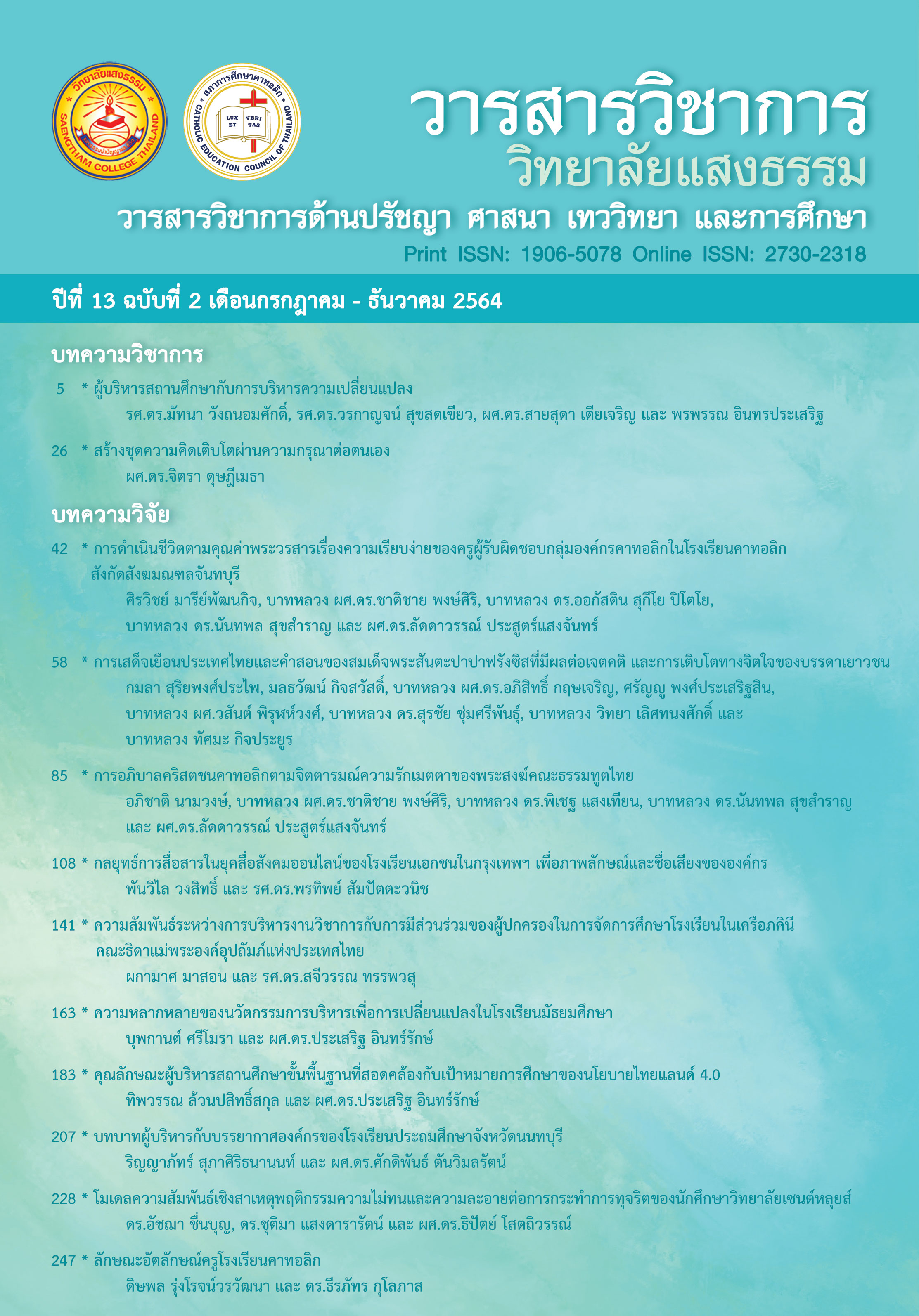The characteristics of basic education school administrator in accordance with education goal of Thailand 4.0
Main Article Content
Abstract
The purpose was to identify the characteristics of basic education school administrators in accordance with the education goal of Thailand 4.0. This research design was Ethnographic Delphi Future Research: EDFR. The research methodology was comprised of 3 steps: firstly, to study the variables and determine the conceptual framework for research, and secondly to analyze the characteristics of basic education school administrators in accordance with the education goal of Thailand 4.0 and third collect information, discuss round 2 EDFR questionnaires from experts the characteristics of basic education school administrator in accordance with education goal of Thailand 4.0. The instruments for collecting the data were a semi-structured interview form and opinionnaire. In addition, there were 19 key informants who were policy proponents/minister/director-General, academicians/lecturer, civil society, and basic education school administrators. The statistics used for data analysis were median, mode, interquartile range, and content analysis. The findings of this research were as follows: The educational administrations the characteristics of basic education school administrator in accordance with education goal of Thailand 4.0 to experts’s opinions were the characteristics of basic education school administrator which composed of eleven correlation components to 91 characteristics were as follows; 1. The characteristics that are related to the goals of equality and equality of learners in the amount of 8 features 2. The characteristics that are related to the goals of the opportunities to study in the amount of 8 features 3. The characteristics that are related to the goals of the quality of the education system in the amount of 9 features 4. The characteristics that are related to the goals of the efficiency of management in the amount of 8 features 5. The characteristics that are related to the goals of effective management in the amount of 9 features 6. The characteristics that are related to the goals of the creative learning relate with Thailand 4.0 in the amount of 8 features 7. The characteristics that are related to the goals of lifelong learning and career Skills in the amount of 9 features 8. The characteristics that are related to the goals of the education create essential knowledge and skills necessary for the 21st century 9. The characteristics that are related to the goals of the responsive education of teacher changes in the amount of 8 features 10. The characteristics that are related to the goals of the responsive education of school in the amount of 8 features 11. The characteristics that are related to the goals of the laws that support education management are independent and responsible in the amount of 8 features
Article Details
- The academic and research articles, as well as the content and opinions expressed therein, published in Saengtham College Journal are solely the responsibility of the respective author(s).
- Articles published in Saengtham College Journal are the property of Saengtham College. Reproduction, modification, or dissemination of all or part of the content in any form without written permission from Saengtham College is prohibited.
- Articles published in Saengtham College Journal are protected under the Copyright Act.
References
กรวิก พรนิมิตร. (2560, ตุลาคม-ธันวาคม). ความรู้ความเข้านโยบาย Thailand 4.0 ในจังหวัดเชียงใหม่ ลำปาง. วารสารวิชาการ พระจอมเกล้าพระนครเหนือ, 27(4).
กิติมา ปรีดีดิลก. (2542). ความรู้เบื้องต้นเกี่ยวกับปรัชญาการศึกษา. กรุงเทพฯ: อักษรบัณฑิต.
เจริญ ภูวิจิตร์. (2558). คุณลักษณะของผู้บริหารสถานศึกษาในอาเซียน. กรุงเทพฯ: ม.ป.ท.
ชัยยนต์ เพาพาน. (2557, ธันวาคม). ผู้บริหารสถานศึกษายุคใหม่ในศตวรรตที่ 21. การประชุมวิชาการระดับชาติครุศาสตร์ ครั้งที่ 1 การจัดการศึกษาเพื่อพัฒนาท้องถิ่น สู่ประชาคมอาเซียน : ทิศทางใหม่ในศตวรรษที่ 21, (1)1.
ถวิล มาตรเลี่ยม. (2549). การปฏิรูปการศึกษาโรงเรียนเป็นฐานการบริหารจัดการ. กรุงเทพฯ: เสมาธรรม.
ทศพร ศิริสัมพันธ์. (2561, มีนาคม). ระบบราชการไทยในบริบทไทยแลนด์ 4.0. สำนักวิจัยและพัฒนาระบบงานบุคคล สำนักงานคณะกรรมการข้าราชการพลเรือน.
นราวิทย์ นาควิเวก. บทบาทของผู้นำที่ดีในยุค 4.0. [ออนไลน์]. สืบค้นเมื่อ : 25 เมษายน 2562 เข้าถึงได้จาก : https://www.smartsme.co.th/cotent/63868.
ปราโมทย์ ประสาทกุล และคณะ. (2550). การเปลี่ยนแปลงประชากรไทยกับการศึกษา เอกสารประกอบการประชุมระดมความคิด เรื่อง “ภาพการศึกษาไทยในอนาคต 10-20 ปี” วันที่ 22-23 กุมภาพันธ์ 2550 จัดโดยสำนักงานเลขาธิการสภาการศึกษา.
ปัทมา ว่าพัฒนวงศ์ และปราโมทย์ ประสาทกุล. ประชากรไทยในอนาคต. [ออนไลน์]. สืบค้นเมื่อ : 14 พ.ค. 60. เข้าถึงได้จาก : http://www.ipsr.mahidol.ac.th.
พรนพ พุกกะพันธุ์. (2542). ภาวะความเป็นผู้นํา. กรุงเทพฯ: จามจุรีโปรดักท์.
พสุ เดชะรินทร์. ทางรอดธุรกิจไทยการศึกษาต้องตอบโจทย์. [ออนไลน์]. สืบค้นเมื่อ : 18 มกราคม 2562. เข้าถึงได้จาก : https://today.line.me/th/pc/article/ทางรอดธุรกิจยุคไทยแลนด์ 4.0 การศึกษาต้องตอบโจทย์.
วิทยากร เชียงกูล. (2553). รายงานสภาวะการศึกษาไทย ปี 2551/2552 บทบาทการศึกษากับการพัฒนาเศรษฐกิจและสังคม. กรุงเทพฯ: ห้างหุ้นส่วนจำกัด วี.ที.ซี. คอมมิวนิเคชั่น.
วิทวัส ดวงภุมเมศ และวารีรัตน์ แก้วอุไร. (2560, กรกฎาคม-ธันวาคม). การจัดการเรียนรู้ในยุคไทยแลนด์ 4.0 ด้วยการเรียนรู้อย่างกระตือรือร้น. วารสารมนุษยศาสตร์และสังคมศาสตร์ บัณฑิตวิทยาลัย มหาวิทยาลัยราชภัฏพิบูลสงคราม. 11(2), 1-14.
สมชาย เทพแสง. ผู้บริหารมืออาชีพ. (2543, มิถุนายน-กรกฎาคม). ข้าราชการครู, 20(3).
สมถวิล ชูทรัพย์. (2550). การพัฒนาเครื่องมือและตัวบ่งชี้คุณลักษณะผู้บริหารสถานศึกษาที่มีประสิทธิภาพ (วิทยานิพนธ์ปริญญาดุษฎีบัณฑิต). นครปฐม: มหาวิทยาลัยศิลปากร.
สมหมาย อ่ำดอนกลอย. (2556, มกราคม – มิถุนายน). บทบาทผู้บริหารสถานศึกษาในศตวรรษที่ 21. วารสารบัณฑิตศึกษา มหาวิทยาลัยราชภัฏพิบูลสงคราม, 7(1).
สำนักงานคณะกรรมการการศึกษาขั้นพื้นฐาน. (2550). เอกสารประกอบการพัฒนาหลักสูตรพัฒนาผู้นำการเปลี่ยนแปลงเพื่อรองรับการกระจายอำนาจสำหรับผู้บริหารการศึกษาและผู้บริหารสถานศึกษา. กรุงเทพฯ: พริกหวานกราฟฟิค.
สำนักงานคณะกรรมการพัฒนาการเศรษฐกิจและสังคมแห่งชาติ. วิสัยทัศน์ประเทศไทยสู่ปี 2570. (เอกสารประกอบการประชุมประจำปี 2551 ของสำนักงานคณะกรรมการพัฒนาการเศรษฐกิจและสังคมแห่งชาติ) ม.ป.ป.
สำนักงานคณะกรรมการพัฒนาการเศรษฐกิจและสังคมแห่งชาติ. (2559, ธันวาคม). แผนพัฒนาเศรษฐกิจและสังคมแห่งชาติ ฉบับที่สิบสอง (พ.ศ.2560-2564). ราชกิจจานุเบกษา เล่ม 133, ตอนที่ 115 ก.
สำนักงานเลขาธิการสภาการศึกษา. บทบาทการศึกษากับการก้าวสู่ยุคไทยแลนด์ 4.0. (2559, ธันวาคม). OEC NEWS letter. 2(1).
เอกชัย กี่สุขพันธ์. คุณลักษณะยุคดิจิทัล. [ออนไลน์]. สืบค้นเมื่อ : 20 มกราคม 2560. เข้าถึงได้จาก : http://www.trueplook-panya.com//knowledge.
Villegas, SanchezBelinda. (2015). Factors influencing administrators’ empowerment and financial management effectiveness. Procedia-Social and Behavioral ciences.


